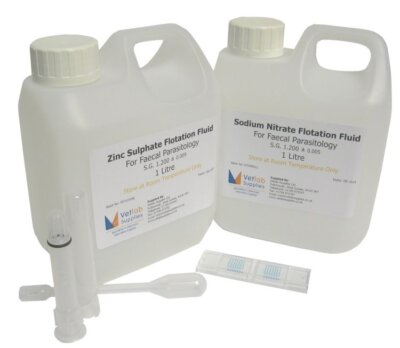
Quick Diagnosis and Treatment of Parasitic Diseases in Animals
Controlling the level of intestinal parasites in livestock and pets is not only essential for their well-being but also for commercial and, in some cases, public health issues. It is very easy for livestock and/or pets to transmit the parasites they carry to human beings and it is becoming more imperative than ever to ensure quick diagnosis and treatment of parasitic diseases in animals, particularly those who are in close proximity to humans.
Drug resistance is now recognised as becoming a major problem
In the past, these parasites were controlled by the practise of routinely worming on regular basis without any form of detection. However, drug resistance is now recognised as becoming a major problem in some of these parasites. As a result, accurate diagnostic laboratory procedures are becoming more popular to not only confirm the identity and level of adult parasite burden but also the effectiveness of treatment. Therefore, the examination of faeces with veterinary equipment for worm eggs using laboratory equipment is one of the most important procedures performed in veterinary practice laboratories. In general, farm animals and other large animals normally have low levels of adult intestinal parasites in their guts so the worm egg count will be performed to identify and assess the level of burden.
In small pets it is more important to keep them free from parasites so normally the flotation/concentration procedure is performed. Both procedures are used to detect the presence of worm eggs or oocysts in faeces which is used as an indirect diagnosis of the presence of intestinal worms. When performed after treatment, these procedures will help to confirm the effectiveness of the drug used.
Faecal Flotation Principle
One of the most accurate and cost-effective methods of faeces examination for intestinal parasite eggs uses special faecal flotation solutions commonly made using either Sodium Nitrate or Zinc Sulphate dissolved in water. The method uses the principle that most worm eggs tend to be lighter than faecal material and in fact have a Specific Gravity (S.G.) of between 1.18 and 1.27. So by mixing faeces with a solution with an S.G. of, say, 1.20 and leaving to settle on the bench, most eggs will float to the surface and other material will sink.
This method helps to separate and concentrate most worm eggs present for viewing under the microscope. However, it is important to remember that some ova, particularly those of tapeworm and fluke, are heavier and will require a solution of higher S.G. for detection.
Some people try to make their own faecal flotation solutions using saturated sodium chloride (table salt) or sugar but make a mistake by assuming that because they appear to be saturated the S.G. is correct. It is vital that the S.G. is measured with a hydrometer before use or a flotation solution made especially for the purpose is purchased.
Vetlab Supplies Faecal Flotation Solutions
Vetlab’s ready-made faecal flotation solutions save you the time and hassle involved in buying, weighing and measuring materials bespoke to your needs. Vetlab’s faecal flotation solutions can be tailored to meet your needs by using your specified solute and adjusting it to your required S.G. since different parasites require solutions of different specific gravity. This is particularly important as there is no quality control faecal material commercially available to check that your own made faecal flotation solution actually works. So if you make your own and do not check its S.G. you may unknowingly be getting the wrong results! If you are not sure, Vetlab recommends you try their Sodium Nitrate S.G.1.20 solution which will detect most eggs and also is particularly effective for detecting Giardia cysts. Vetlab also supply Ovatube (parasite detection) and Mcmaster counting slides both glass and acrylic.
Why not see what a difference Vetlab could make to your diagnosis? Inquire today for more information on how we can help you. Telephone: 01798 874567

